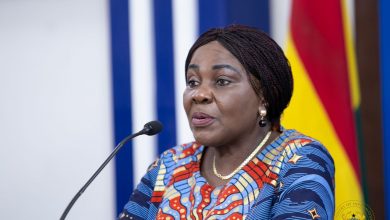GACC Emphasizes Need for Enforcing Political Party Funding Legislation to Ensure Accountability

The Executive Secretary of the Ghana Anti-Corruption Coalition (GACC), Mrs. Beauty Emefa Narteh, has emphasized the importance of strict legislation enforcement regarding the funding sources for political party activities.
]She advocates this measure to combat the monetization and corruption associated with partisan activities, ultimately fostering greater government accountability.
She spoke at the West Africa Democracy Radio (WADR) Democracy and Governance Forum in Accra, themed “Strengthening Democratic Processes: Ghana’s Preparedness for Free, Fair and Transparent Elections,” supported by the National Endowment for Democracy.
In her presentation on “Safeguarding Elections: Integrity, Accountability, Civic Education, and Preventing Electoral Violence,” Mrs. Narteh expressed concern over the increasing election expenditures for individuals aspiring to become Members of Parliament and the President.
Citing a report by CDD and WFD, she noted that the cost of running for Parliament rose by 59% between 2012 and 2016. In 2016, it averaged GHC 389,803 (approximately $85,000) to secure a nomination in a party primary and participate in the parliamentary elections, while nearly $100 million was needed for the Presidential primary.

Regarding vote buying, the Executive Secretary of the Ghana Anti-Corruption Coalition, Mrs. Beauty Emefa Narteh, stated that this practice undermines the country’s democracy. She referenced a 2022 survey by UNODC and CHRAJ, which found that 10.3% of Ghana’s adult population reported being offered money or favors in exchange for their votes during the 2020 general election. Specifically, 5.3% were offered money, while 5.1% were offered other goods or services.
To address the various challenges in Ghana’s electoral process, Mrs. Narteh emphasized the urgent need for a strategy to safeguard elections and their outcomes. She proposed several recommendations:
- The Electoral Commission (EC) should enhance transparency and accountability with all stakeholders.
- The Inter-Party Advisory Committee (IPAC) should facilitate civic education and work to reduce potential violence by ensuring all stakeholders adhere to agreements made during IPAC meetings.
- Amend PNDCL 284 to establish a shorter timeline for resolving parliamentary election petitions at the High Courts and Court of Appeals.
- Provide the National Commission for Civic Education (NCCE) with resources to intensify civic education on election violence and fraud.
- Enforce legislation regarding the sources of funding for political party activities.
- Regulate campaign finance.
- Implement a robust asset declaration regime.
In her opening remarks, Mrs. Agnes E. John-Thomasi, Manager of WADR, highlighted the organization’s commitment to producing and disseminating comprehensive information on voter rights and providing platforms for democratic engagement. She noted that the current project focuses on three countries—Ghana, Côte d’Ivoire, and Guinea-Bissau—that will hold elections in 2024 and 2025, aiming to enhance civic education and engagement.
Mrs. John-Thomasi emphasized that West Africa Democracy Radio, a bilingual broadcaster with a team of journalists covering thirteen countries, plays a crucial role in promoting democracy in the region. She explained that the Democracy and Governance Forum aims to create a platform for deeper reflection on democratic processes, particularly free and transparent elections.
Dr. Audrey Gadzekpo, a Board Member of WADR, underscored the media’s vital role in democracy, urging journalists to actively scrutinize candidates’ policies, expose electoral irregularities, and uphold their watchdog responsibilities. She cautioned against the misuse of social media, emphasizing the importance of avoiding disinformation and misinformation.
Dr. Gadzekpo concluded by reminding participants that democracy is a long journey, and while elections are critical, a free and fair electoral process is essential for any democracy to thrive.





